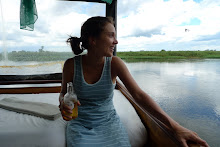Who said all of Botswana was flat?
Last weekend I took a bus to Lobatse to visit my friend Bio, who had invited me to a concert at her (7th Day Adventist) church on Saturday night. Most of Botswana is dead flat but in the south, towns like Lobatse sit in low valleys (freezing in the winter I can attest) encircled by bush-covered hills and rocky outcroppings. I arrived around lunchtime and we walked to over to Bio’s apartment, where about ten girls our age from her church were gathered to eat lunch after Sabbath services. Crammed into her and her roommate Barati’s little room, we sat on the beds eating a delicious and huge lunch made by Bio and Barati, while Bio and her friends discussed the pastor’s sermon and I rather hopelessly tried to follow a conversation in Setswana in which everyone was talking all at once and at break-neck speed. I understood enough (and enough English got mixed in and translated for me), that I was able to follow that they were talking about the pressures to get married, the attempts to feel comfortable with being single as a twenty-something year old female, the dangers of rushing into marriage, and the importance of good supportive girlfriends. Their conversation didn’t sound so far off from conversations we have back home. Add to that the fact that Facebook came up in the conversation (is it a useful tool to stay in touch with people? Or an addictive habit that encourages creepy stalking and exhibitionism?), and for a second I could have forgotten I was in a dusty town famed in Botswana only for its large-scale abattoir. Does Sarah Jessica Parker have any idea that young women in Botswana are comparing their friends’ shoes to Carrie Bradshaw’s and wondering what exactly a pair of Jimmy Choo’s looks like?
Thomas Friedman might say that this is all just further evidence that the world is flat. But despite the attractiveness of this thesis, and bits of evidence that seem to support it, the world is so very not flat, even here. And to highlight the way in which Western images, brands and technology make their way to places like Botswana and ignore the incredible differences that also exist seems to me to be to very selective--a depiction of the world that is seductive and thus very dangerous in terms of what it leaves out, or glosses over. All is not right and fair just because a kid in Bangalore can create an iPod app. What about the fact that while Sex and the City plays on the T.V., these girls in Lobatse are likely to be boiling hot water to take a bath, in a house where there is no running hot water, if running water at all? Or that Matheba, who used to work at an American-style supermarket here in the capital Gaborone asked me last night if there are bathrooms on airplanes or little shops on board where you can buy food in flight?
In a discussion panel on the portrayal of Africa by Western fiction writers that I attended at University of Botswana today, several scholars mentioned that Alexander McCall Smith’s Ladies Detective Agency novels, with their nostalgic dream-like quality, present a similarly dangerous one-sided view of the African world. In Smith’s Botswana, there are traditionally built ladies with admirable gumption, and men like J.L.B. Matekoni with respectable values, but there is no AIDS, hunger, conflicted identities or violence. Smith himself has said in interviews that with his books he has tried to counter the crushing weight of literature and media that depicts only the dark side of Africa—a worthy aim—but as much as I enjoyed reading his books, I have to admit that he may have swung too far in the other direction. The books are lovely to read, as a sort of escapism, but they certainly don’t go beyond the surface of any kind of life here. If only life were as simple as he makes it out to be for Batswana.
I think though, the difference between Smith and Friedman type depictions is that Smith’s works are self-labelled fiction—he may be giving the wrong idealized impression of Botswana to the Western world (creating complacency on our part? or so argued one scholar today) but he has never claimed to be doing more than telling a good story, with the backdrop happening to be southern Botswana. Friedman, on the other hand, really seems to believe that what he is saying represents reality (maybe that’s because he never leaves the cushy homes and offices of Bangalore’s top CEOs). And even if he taps into one component of one person or group of people’s reality, what seems to be equally important is all that is missing; all that goes unnoticed, ignored—the not so warm and fuzzy stuff that if brought to light, would remind us that the world is not only not flat, but full of bumps, sharp turns and unexpected contours.


0 Comments:
Post a Comment
<< Home